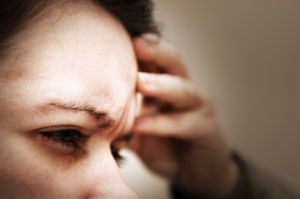by
Brendon Nafziger, DOTmed News Associate Editor | October 28, 2009

Migrane with aura
could be a trouble sign
A new study adds menace to misery for those suffering from migraines with aura.
As reported online in the British Medical Journal on Tuesday, young women with migraines accompanied by aura, often mild visual hallucinations such as flashes of light that resemble 'white noise' on a dead channel, have double the risk of stroke.
This increase in risk mostly affected women, particularly younger women, not men, and those with auraless migraines had no added stroke risk.



Ad Statistics
Times Displayed: 1227
Times Visited: 6 Fast-moving cardiac structures have a big impact on imaging. Fujifilm’s SCENARIA View premium performance CT brings solutions to address motion in Coronary CTA while delivering unique dose saving and workflow increasing benefits.
"What we can say is definitely something about the aura, and migraines, increases the risk for ischemic strokes, but the underlying pathology is a black box," Markus Schurks, M.D., lead author of the study and a doctor at Harvard Medical Center, tells DOTmed News.
While the study, a retrospective analysis of previous research measuring the risk for stroke in those with migraines, can't define the absolute risk to young women, it is probably extremely low.
"For an individual, it probably doesn't make much of a difference, but on a population level: up to 20 percent of people have migraines, that's quite a big number. And if you consider the greatest risk is among young women, the prevalence [of migraines] goes up to 30 or 35 percent," Dr. Schurks says.
Women with migraines with aura who smoked, used oral birth control pills and were under 45 showed the greatest risk for stroke.
The reason for the association between migraines and stroke is unclear, Dr. Schurks says. Hormones might play a role, he acknowledges, but migraines have many complex environmental and genetic factors, and he suspects there's "some kind of cumulative effect in the vasculature," that science doesn't yet know about.
Still, Dr. Schurks suspects triptan, a drug commonly prescribed to those with migraines that acts on serotonin receptors, and is known to constrict blood vessels, is probably not the culprit.
"There have been very big studies among the migranous [on triptan]," he says, and "an increase in triptan doesn't show an increase in risk [for stroke]."
The real cause awaits future studies. "[We're] working with some data investigating this association," Dr. Schurks says. "The dice are rolling."

